人教版初中英语常用最易混淆的28组词
- 格式:pptx
- 大小:99.82 KB
- 文档页数:25
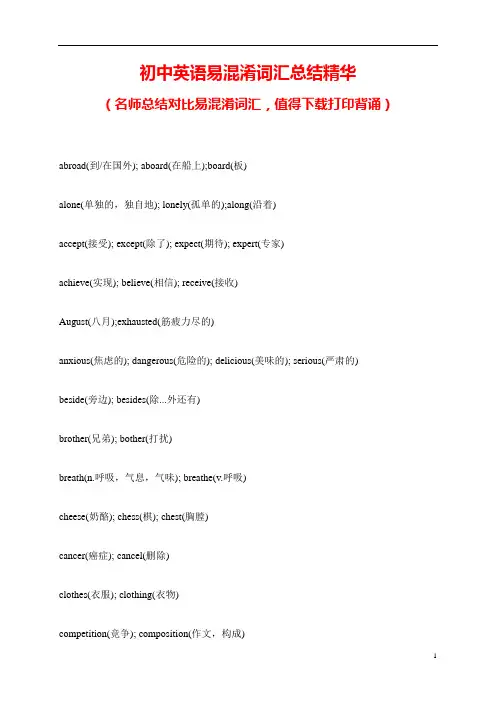
初中英语易混淆词汇总结精华(名师总结对比易混淆词汇,值得下载打印背诵)abroad(到/在国外); aboard(在船上);board(板)alone(单独的,独自地); lonely(孤单的);along(沿着)accept(接受); except(除了); expect(期待); expert(专家)achieve(实现); believe(相信); receive(接收)August(八月);exhausted(筋疲力尽的)anxious(焦虑的); dangerous(危险的); delicious(美味的); serious(严肃的) beside(旁边); besides(除...外还有)brother(兄弟); bother(打扰)breath(n.呼吸,气息,气味); breathe(v.呼吸)cheese(奶酪); chess(棋); chest(胸膛)cancer(癌症); cancel(删除)clothes(衣服); clothing(衣物)competition(竞争); composition(作文,构成)confusing(混乱的); fascinating(迷人的); frustrating(令人沮丧的);convincing(有说服力的) chop (砍); shop(商店,购物)create(创造); creative(有创造力的); creature(生物)chicken(鸡); kitchen(厨房);children(孩子)chose(选择) ; chase(追逐)costume(服装); custom(文化);customer(顾客)crow(乌鸦) ;clown(小丑); cow(奶牛)dessert(甜点); desert(沙漠)dollar(美元); similar(相似的); familiar(熟悉的); guitar(吉他)dining-room(食堂); dinning(喧闹); dinner(晚餐)dare(敢); dairy(日记); fairly(公平地); hair(头发); pair(双,对)destory(毁坏); toy(玩具); enjoy(享受,喜欢)decision(决定); direction(方向)double(两倍的); couple(夫妇)except(除了); expect(期待); accept(接受); expert(专家)expect(希望); respect(尊重)early(早地): easily(容易地)energy(能量); energetic(精力充沛的); engineer(工程师) entertainment(娱乐); environment(环境)especially(特别,尤其);particularly(格外);specially(特殊地) expensive(昂贵的);experience(经验); experiment(实验) express(表达); impress(使印象深刻); press(按压) electronic(电子的);comic(滑稽的);magic(魔术)floor(地板); flour(面粉);flower(花朵)fight(打架); flight(飞行)fruit(水果); unit(单元); guitar(吉他); guide(指导); suit(套装) great(好的);greet(打招呼)guess(猜); guest(客人)heard(听); heart(心); heat(高温) ; head(头)furniture(家具); future(未来); gesture(手势);temperature(温度); true(真的); nature(自然) hid(藏); hit(击打)hill(小山丘);hall(厅堂); kill(杀害)hold(拿住); hole(洞)instrution(指导); instrument(工具,乐器) invent(发明); invite(邀请)later(稍后); latest(最近的) ; lately(最近)lead(领导); leaf(叶子)land(陆地); lend(借给)litter(垃圾); little(小/少的); letter(信件)line(线); lion(狮子)lie-lay-lain(躺),(位于); lay-laid-laid(下蛋) march(行军); match(比赛,搭配)metal(金属); medal(奖牌); model(模型,模特) monkey(猴子); donkey(驴)national(国家的,民族的); natural(自然的) ninth(第九); ninety(第九十)offer(提供); officer(官员)outgoing(外向的); outstanding(杰出的) purpose(目的); suppose(期待)pass(通过); past(过去的); post(邮寄) plane(飞机); planet(小行星); plant(植物) pool(水池); poor(贫穷的)quite(十分,非常); quiet (安静的)regard(视为); regret(后悔)remain(保持); remind(提醒)repeat(重复); report(报道)raise(筹集); rise(上升); rose【名词】(玫瑰) rain(雨);pain(疼痛); lain(躺)seem(似乎); seen(看见)send(发送):sand(沙子)single(单个的); simple(简单的)soup(汤); soap(肥皂)sour(酸的); tour(旅游)street(街道); strict(严格的); secret(秘密)succeed(成功v.); success(成功n.)support(支持); suppose(假定); surprise(惊喜)supper(晚餐); super(超级的)tower(塔); towel(毛巾)till(直到); until(直到)value(价值); volunteer(志愿)specific(具体的); energetic(有活力的);fantastic(极好的) socks(袜子); stockings(长筒袜)stick(坚持,棍); strict(严格的)story(故事); store(商店)sweet(甜的); sweat(汗); sweep(擦) through(通过); although(尽管)。
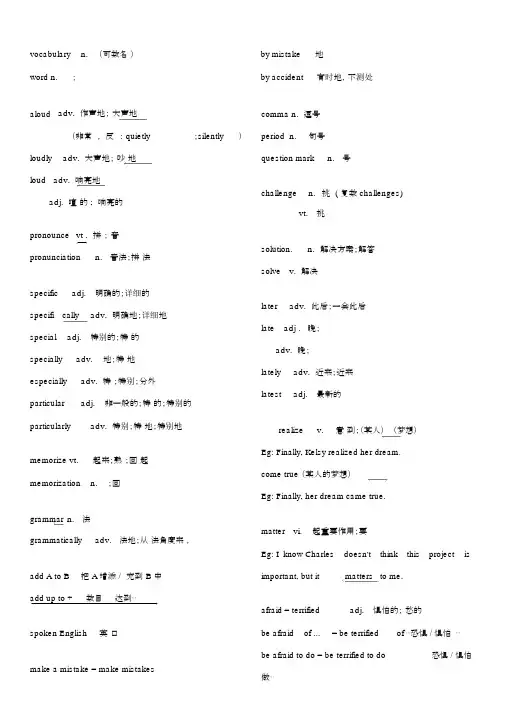
vocabulary n. (可数名)by mistake地word n.;by accident有时地,不测处aloud adv. 作声地;大声地comma n.逗号(非常,反: quietly;silently)period n.句号loudly adv. 大声地;吵地question mark n. 号loud adv. 响亮地adj. 喧的;响亮的challenge n.挑 ( 复数 challenges)vt.挑pronounce vt . 拼;音pronunciation n. 音法;拼法specific adj.明确的;详细的specifi cally adv. 明确地;详细地special adj.特别的;特的specially adv. 地;特地especially adv. 特;特别;分外particular adj.非一般的;特的;特别的particularly adv. 特别;特地;特别地memorize vt.起来;熟;回起memorization n. ;回grammar n. 法grammatically adv. 法地;从法角度来,add A to B把A增添/充到B中add up to +数目达到⋯spoken English英口make a mistake = make mistakes solution.n. 解决方案;解答solve v. 解决later adv. 此后;一会此后late adj .晚;adv. 晚;lately adv. 近来;近来latest adj.最新的realize v.意到;(某人)(梦想)Eg: Finally, Kelsy realized her dream.come true (某人的梦想)Eg: Finally, her dream came true.matter vi.起重要作用;要Eg: I know Charles doesn't think this project is important, but it matters to me.afraid = terrified adj.惧怕的;愁的be afraid of ... = be terrified of ⋯恐惧 / 惧怕⋯be afraid to do = be terrified to do恐惧/惧怕做⋯laugh at⋯= make fun of⋯讥笑/嘲讽⋯complete vt.达成adj.完好的;完好的completely adv 完好地childhood n. 童年on duty班;日break off忽然中断;中断break down抛;出缺点break up分手take a ride兜take care小心,注意;珍重sb.be sure of sth.sb. be sure to do sth.sb. Be sure that⋯it is certain(无疑;确立) thatcertain adj.某,某些,某个Eg:friendly的比是friendlier,最高是friendliestcomic n.漫画,画志patient adj.耐心的n.病人patiently adv. 耐心地at the end of⋯in the endtake pride in⋯= be proud of⋯with pleasure能够用来答方的求,Eg: “Would you mind holding the door open forme, please ” “Oh, with pleasure.”It ’ s a pleasure.或It’s my pleasure.是用往返答感的答。
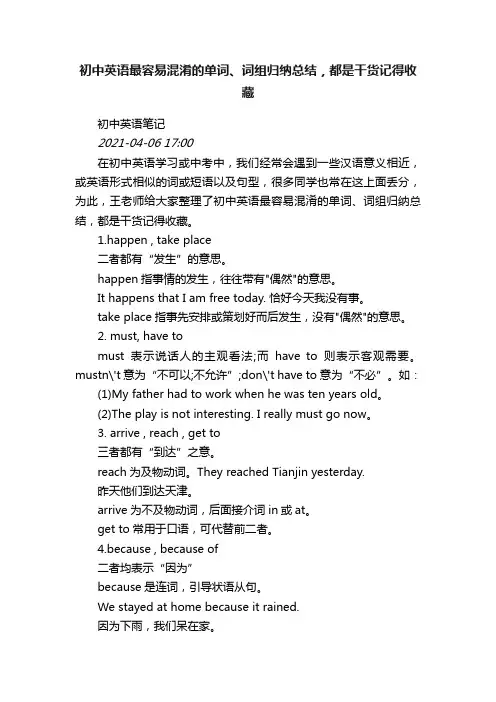
初中英语最容易混淆的单词、词组归纳总结,都是干货记得收藏初中英语笔记2021-04-06 17:00在初中英语学习或中考中,我们经常会遇到一些汉语意义相近,或英语形式相似的词或短语以及句型,很多同学也常在这上面丢分,为此,王老师给大家整理了初中英语最容易混淆的单词、词组归纳总结,都是干货记得收藏。
1.happen , take place二者都有“发生”的意思。
happen指事情的发生,往往带有"偶然"的意思。
It happens that I am free today. 恰好今天我没有事。
take place指事先安排或策划好而后发生,没有"偶然"的意思。
2. must, have tomust表示说话人的主观看法;而have to则表示客观需要。
mustn\'t意为“不可以;不允许”;don\'t have to意为“不必”。
如:(1)My father had to work when he was ten years old。
(2)The play is not interesting. I really must go now。
3. arrive , reach , get to三者都有“到达”之意。
reach为及物动词。
They reached Tianjin yesterday.昨天他们到达天津。
arrive为不及物动词,后面接介词in或at。
get to常用于口语,可代替前二者。
4.because , because of二者均表示“因为”because是连词,引导状语从句。
We stayed at home because it rained.因为下雨,我们呆在家。
because of是短语介词,后面接名词性词语。
We stayed at home because of the rain .因为下雨,我们呆在家。
5. in front of, in the front ofin front of…意思是"在……前面",指甲物在乙物之前,两者互不包括;其反义词是behind(在……的后面)。
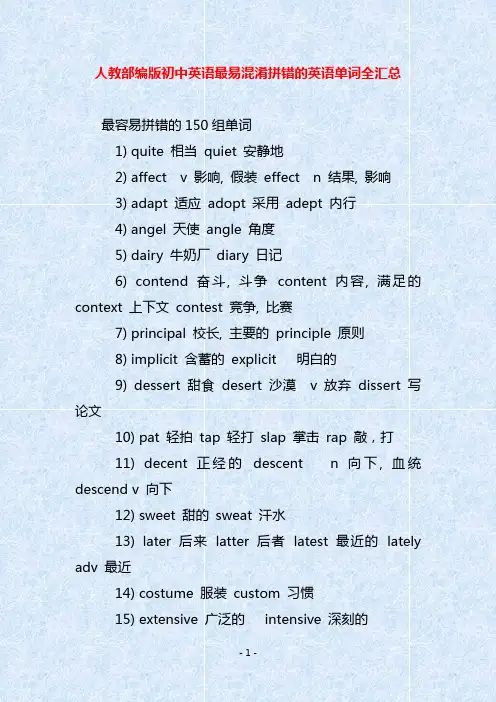
人教部编版初中英语最易混淆拼错的英语单词全汇总最容易拼错的150组单词1) quite 相当quiet 安静地2) affect v 影响, 假装effect n 结果, 影响3) adapt 适应adopt 采用adept 内行4) angel 天使angle 角度5) dairy 牛奶厂diary 日记6) contend 奋斗, 斗争content 内容, 满足的context 上下文contest 竞争, 比赛7) principal 校长, 主要的principle 原则8) implicit 含蓄的explicit 明白的9) dessert 甜食desert 沙漠v 放弃dissert 写论文10) pat 轻拍tap 轻打slap 掌击rap 敲,打11) decent 正经的descent n 向下, 血统descend v 向下12) sweet 甜的sweat 汗水13) later 后来latter 后者latest 最近的lately adv 最近14) costume 服装custom 习惯15) extensive 广泛的intensive 深刻的16) aural 耳的oral 口头的17) abroad 国外aboard 上(船,飞机)18) altar 祭坛alter 改变19) assent 同意ascent 上升accent 口音20) champion 冠军champagne 香槟酒campaign 战役21) baron 男爵barren 不毛之地的barn 古仓22) beam 梁,光束bean 豆been have 过去式23) precede 领先proceed 进行,继续24) pray 祈祷prey 猎物25) chicken 鸡kitchen 厨房26) monkey 猴子donkey 驴27) chore 家务活chord 和弦cord 细绳28) cite 引用site 场所sight 视觉29) clash (金属)幢击声crash 碰幢,坠落crush 压坏30) compliment 赞美complement 附加物31) confirm 确认conform 使顺从32) contact 接触contract 合同contrast 对照33) council 议会counsel 忠告consul 领事34) crow 乌鸦crown 王冠clown 小丑cow 牛35) dose 一剂药doze 打盹36) drawn draw 过去分词drown 溺水37) emigrant 移民到国外immigrant 从某国来的移民38) excess n 超过exceed v超过excel 擅长39) hotel 青年旅社hostel 旅店40) latitude 纬度altitude 高度gratitude 感激41) immoral 不道德的immortal 不朽的42) lone 孤独的alone 单独的lonely 寂寞的43) mortal 不死的metal 金属mental 神经的medal 勋章model 模特meddle 玩弄44) scare 惊吓scarce 缺乏的45) drought 天旱draught 通风, 拖拉draughts (英)国际跳棋47) assure 保证ensure 使确定insure 保险48) except 除外expect 期望accept 接受excerpt 选录exempt 免除49) floor 地板flour 面粉50) incident 事件accident 意外51) inspiration 灵感aspiration 渴望52) march 三月, 前进match 比赛53) patent 专利potent 有力的potential 潜在的54) police 警察policy 政策politics 政治。
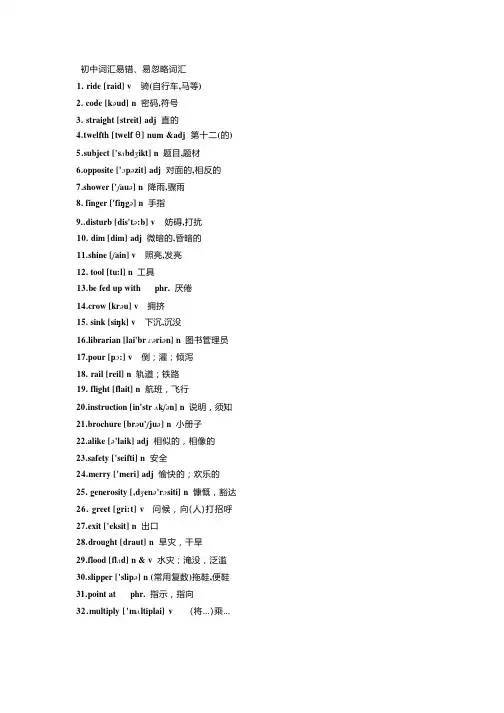
初中词汇易错、易忽略词汇1.ride[raid]v骑(自行车,马等)2.code[kəud]n密码,符号3.straight[streit]adj直的4.twelfth[twelfθ]num&adj第十二(的)5.subject['sʌbdʒikt]n题目,题材6.opposite['ɔpəzit]adj对面的,相反的7.shower['ʃauə]n降雨,骤雨8.finger['fiŋgə]n手指9..disturb[dis'tə:b]v妨碍,打扰10.dim[dim]adj微暗的,昏暗的11.shine[ʃain]v照亮,发亮12.tool[tu:l]n工具13.be fed up with phr.厌倦14.crow[krəu]v拥挤15.sink[siŋk]v下沉,沉没16.librarian[lai'brɛəriən]n图书管理员17.pour[pɔ:]v倒;灌;倾泻18.rail[reil]n轨道;铁路19.flight[flait]n航班,飞行20.instruction[in'strʌkʃən]n说明,须知21.brochure[brəu'ʃjuə]n小册子22.alike[ə'laik]adj相似的,相像的23.safety['seifti]n安全24.merry['meri]adj愉快的;欢乐的25.generosity[,dʒenə'rɔsiti]n慷慨,豁达26.greet[gri:t]v问候,向(人)打招呼27.exit['eksit]n出口28.drought[draut]n旱灾,干旱29.flood[flʌd]n&v水灾;淹没,泛滥30.slipper['slipə]n(常用复数)拖鞋,便鞋31.point at phr.指示,指向32.multiply['mʌltiplai]v(将…)乘…1. steer[stiə]n&v驾驶,掌舵2. dive[daiv]v潜入(水中),跳水3. set off['setɔf]phr.出发,动身,起初4. spoil[spɔil](spoilt[spɔilt],)v糟蹋5. mark[m a:k]n记号;标记;痕迹6. shelf[ʃelf](pl.shelves[ʃelvz])n架子;搁板7. rub[r^b]v磨,擦8. button['b^tn]n按钮,纽扣9. edge[ed3]n边,边缘10. warn[wɔ:n]v警告,提醒11. track[træk]n(火车等的)轨道,跑道12. frustrate[fr^s'treit]v使沮丧,使失败13. terrific[tə'rifik]adj很棒的,极好的14. single['siŋgl]adj单个的,只有一个的15. pause[pɔ:z]v&n中止,暂停16. fragile['fræd3il]adj易碎的17. entrance['entrəns]n入口,进口,入场18. grand[grænd]adj豪华的,庄重的,雄伟的19. rewarding[ri'wɔ:diŋ]adj值得作的20. grateful['greitfəl]adj感激的,感谢的21. grab[græb]v抓取…,夺取22. spill(spilt[spilt],)[spil]v溢出,溅出,洒出23. check-out['tʃek,aut]n结帐台,收银台24. wag[wæg]v摆动,摇动(尾巴等)25. drop off['drɔpɔf]phr.放下(某物),下车26. chart[tʃa:t]n图表27. audience['ɔ:diəns]n听众28. deserve[di'zə:v]v应得,值得…29. rough[rʌf]adj粗鲁的,激烈的30. tail[teil]n尾巴,尾部31. square[skwɛə]n平方, (方形的)广场32. diagram['daiəgræm]n图表。
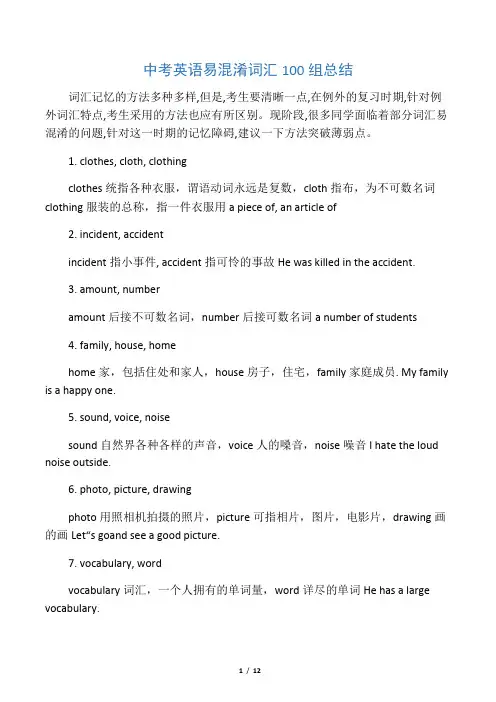
中考英语易混淆词汇100组总结词汇记忆的方法多种多样,但是,考生要清晰一点,在例外的复习时期,针对例外词汇特点,考生采用的方法也应有所区别。
现阶段,很多同学面临着部分词汇易混淆的问题,针对这一时期的记忆障碍,建议一下方法突破薄弱点。
1. clothes, cloth, clothingclothes统指各种衣服,谓语动词永远是复数,cloth指布,为不可数名词clothing服装的总称,指一件衣服用a piece of, an article of2. incident, accidentincident指小事件, accident指可怜的事故He was killed in the accident.3. amount, numberamount后接不可数名词,number后接可数名词a number of students4. family, house, homehome家,包括住处和家人,house房子,住宅,family家庭成员. My family is a happy one.5. sound, voice, noisesound自然界各种各样的声音,voice人的嗓音,noise噪音I hate the loud noise outside.6. photo, picture, drawingphoto用照相机拍摄的照片,picture可指相片,图片,电影片,drawing画的画Let“s goand see a good picture.7. vocabulary, wordvocabulary词汇,一个人拥有的单词量,word详尽的单词He has a large vocabulary.8. population, peoplepopulation人口,人数,people详尽的人China has a large population.9. weather, climateweather一天内详尽的天气状况,climate长期的气候状况The climate here is not good foryou.10. road, street, path, wayroad详尽的公路,马路,street街道,path小路,小径,way道路,途径take this road; in the street, show me the way to the museum.11. course, subjectcourse课程(可包括多门科目),subject科目(详尽的学科)a summer course12. custom, habitcustom传统风俗,习俗,也可指生活习惯,后接to do,habit生活习惯,习惯成自然,后接of doing. I“ve got the habit of drinking a lot.13. cause, reasoncause指造成某一事实或现象的直接原因,后接of sth./doing sth,reason用来解释某种现象或结果的理由,后接for sth./doing sth. the reason for being late14. exercise, exercises, practiceexercise运动,锻炼(不可数),exercises练习(可数),practice(反复做的)练习Practicemakes perfect.15. class, lesson作“课“解时,两者可以替换.指课文用lesson.指班级或全体学生用class. lesson 6; class 516. speech, talk, lecturespeech指在公共场所所做的经过准备的较正式的演说,talk日常生活中的大凡的谈话,讲话,lecture学术性的演讲,讲课a series of lecture on…17. officer, officialofficer部队的军官,official政府官员an army officer18. work, job二者均指工作。
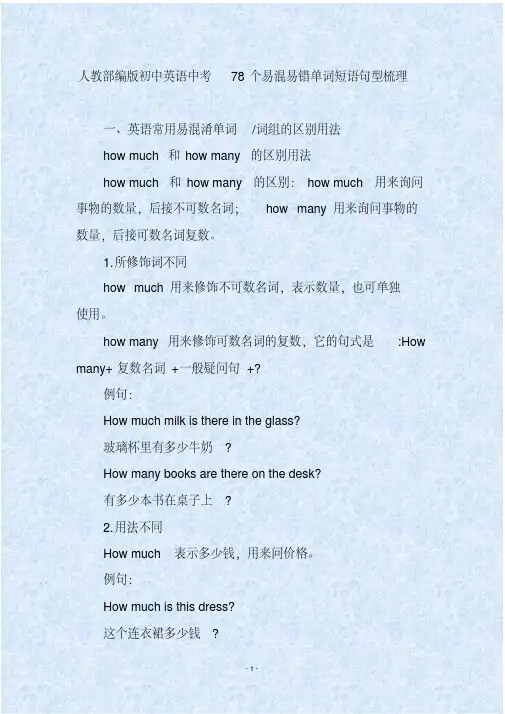
人教部编版初中英语中考78个易混易错单词短语句型梳理一、英语常用易混淆单词/词组的区别用法how much和how many的区别用法how much和how many的区别:how much用来询问事物的数量,后接不可数名词;how many用来询问事物的数量,后接可数名词复数。
1.所修饰词不同how much用来修饰不可数名词,表示数量,也可单独使用。
how many用来修饰可数名词的复数,它的句式是:How many+复数名词+一般疑问句+?例句:How much milk is there in the glass?玻璃杯里有多少牛奶?How many books are there on the desk?有多少本书在桌子上?2.用法不同How much 表示多少钱,用来问价格。
例句:How much is this dress?这个连衣裙多少钱?How many 表示多少,用来问数量。
例句:How many apples do you have?你有多少苹果?in和on的区别用法当我们表示某些东西被其他东西所包围时使用“in”这个词。
而“on”用于描述物体被放置在其他物体上方或外部的情况。
in可表时间,表地点,表手段、方法、材料。
on表示时间、地点、方位等。
1.意思不同in:prep.在 ... 里;在 ... 地方;在 ... 期间on:prep.在 ... 之上2.用法不同in:in着重一段时间的过程,常用于重复动作或延续动作。
in表示从现在时间算起推移到将来的一段时间之后,一般与将来时态连用。
例句:He is a layman in economics.他对经济学一窍不通。
on:表示“在物体的表面上”,只能用on的表达方式有on the next morning,on the following。
例句:The spider is walking on the ceiling.蜘蛛在天花板上爬行。
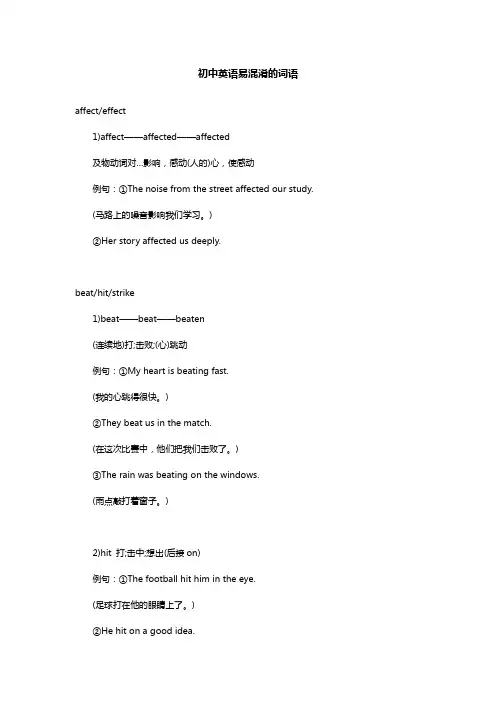
初中英语易混淆的词语affect/effect1)affect——affected——affected及物动词对…影响,感动(人的)心,使感动例句:①The noise from the street affected our study.(马路上的噪音影响我们学习。
)②Her story affected us deeply.beat/hit/strike1)beat——beat——beaten(连续地)打;击败;(心)跳动例句:①My heart is beating fast.(我的心跳得很快。
)②They beat us in the match.(在这次比赛中,他们把我们击败了。
)③The rain was beating on the windows.(雨点敲打着窗子。
)2)hit 打;击中;想出(后接on)例句:①The football hit him in the eye.(足球打在他的眼睛上了。
)②He hit on a good idea.(他想出了一个好主意。
)③He hit his head hard on the floor when he fell down.(当他倒下时,头重重地碰到地板上。
)3)strike——struck——struck打;敲;打动(心);擦(火柴);报时;突然想到,用途较广。
例句:①Strike while the iron is hot.(趁热打铁。
)②Don't strike the man with a stick.(不要用棒子打那个男人。
)join/join in/take part in/attend1)join及物动词加入(团体,组织,参军)、同……一起干或玩、连接例句:①I joined the Party in 1975.(我1975年入党。
)②His brother joined the army two years ago.(两年前他哥哥参军。
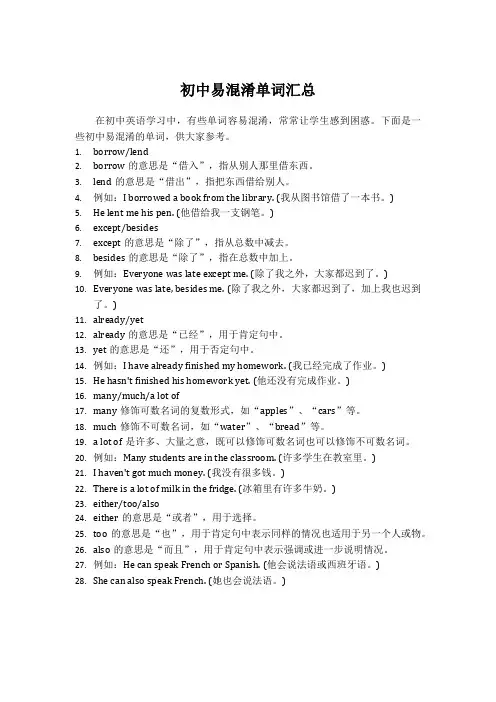
初中易混淆单词汇总在初中英语学习中,有些单词容易混淆,常常让学生感到困惑。
下面是一些初中易混淆的单词,供大家参考。
1.borrow/lend2.borrow的意思是“借入”,指从别人那里借东西。
3.lend的意思是“借出”,指把东西借给别人。
4.例如:I borrowed a book from the library. (我从图书馆借了一本书。
)5.He lent me his pen. (他借给我一支钢笔。
)6.except/besides7.except的意思是“除了”,指从总数中减去。
8.besides的意思是“除了”,指在总数中加上。
9.例如:Everyone was late except me. (除了我之外,大家都迟到了。
)10.Everyone was late, besides me. (除了我之外,大家都迟到了,加上我也迟到了。
)11.already/yet12.already的意思是“已经”,用于肯定句中。
13.yet的意思是“还”,用于否定句中。
14.例如:I have already finished my homework. (我已经完成了作业。
)15.He hasn't finished his homework yet. (他还没有完成作业。
)16.many/much/a lot of17.many修饰可数名词的复数形式,如“apples”、“cars”等。
18.much修饰不可数名词,如“water”、“bread”等。
19. a lot of是许多、大量之意,既可以修饰可数名词也可以修饰不可数名词。
20.例如:Many students are in the classroom. (许多学生在教室里。
)21.I haven't got much money. (我没有很多钱。
)22.There is a lot of milk in the fridge. (冰箱里有许多牛奶。
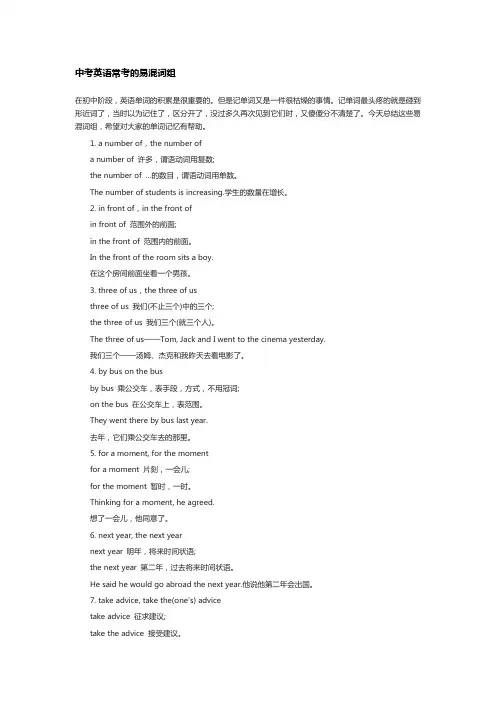
中考英语常考的易混词组在初中阶段,英语单词的积累是很重要的。
但是记单词又是一件很枯燥的事情。
记单词最头疼的就是碰到形近词了,当时以为记住了,区分开了,没过多久再次见到它们时,又傻傻分不清楚了。
今天总结这些易混词组,希望对大家的单词记忆有帮助。
1. a number of,the number ofa number of 许多,谓语动词用复数;the number of …的数目,谓语动词用单数。
The number of students is increasing.学生的数量在增长。
2. in front of,in the front ofin front of 范围外的前面;in the front of 范围内的前面。
In the front of the room sits a boy.在这个房间前面坐着一个男孩。
3. three of us,the three of usthree of us 我们(不止三个)中的三个;the three of us 我们三个(就三个人)。
The three of us——Tom, Jack and I went to the cinema yesterday.我们三个——汤姆、杰克和我昨天去看电影了。
4. by bus on the busby bus 乘公交车,表手段,方式,不用冠词;on the bus 在公交车上,表范围。
They went there by bus last year.去年,它们乘公交车去的那里。
5. for a moment, for the momentfor a moment 片刻,一会儿;for the moment 暂时,一时。
Thinking for a moment, he agreed.想了一会儿,他同意了。
6. next year, the next yearnext year 明年,将来时间状语;the next year 第二年,过去将来时间状语。
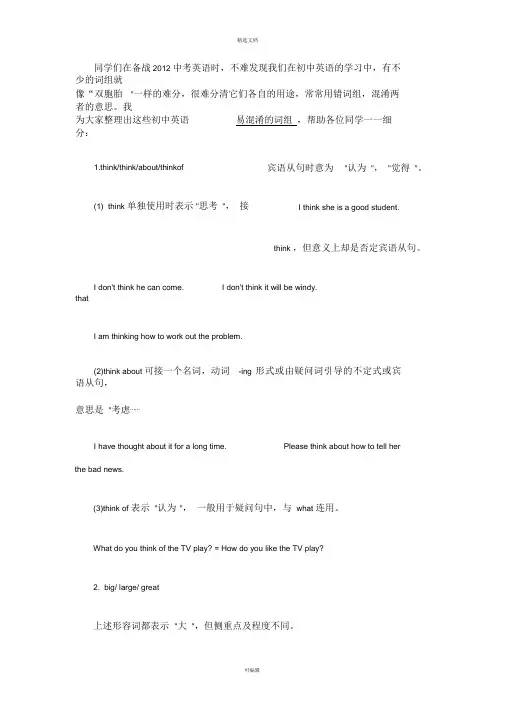
同学们在备战 2012 中考英语时,不难发现我们在初中英语的学习中,有不少的词组就像“双胞胎 "一样的难分,很难分清它们各自的用途,常常用错词组,混淆两者的意思。
我为大家整理出这些初中英语 易混淆的词组 ,帮助各位同学一一细分:1.think/think/about/thinkof(1) think 单独使用时表示 "思考 ", 接thatI am thinking how to work out the problem.(2)think about 可接一个名词,动词 -ing 形式或由疑问词引导的不定式或宾语从句, 意思是 "考虑⋯⋯the bad news.(3)think of 表示 "认为 ", 一般用于疑问句中,与 what 连用。
What do you think of the TV play? = How do you like the TV play?2. big/ large/ great上述形容词都表示 "大 ",但侧重点及程度不同。
宾语从句时意为 "认为 ", "觉得 "。
I think she is a good student.think ,但意义上却是否定宾语从句。
I don't think he can come. I don't think it will be windy.I have thought about it for a long time.Please think about how to tell her(1) big 指具体事物的大小,强调比正常形体的标准大,既可用在普通场合,也可用在正式场合。
它可用来指人的身材高大或"长大了",还可表示"伟大","重要"之意。
初中英语易混淆单词1:pronounce 发.......音 , pronunciation 发音2:hard adj.& adv. 硬的;辛苦地,努力地 hardly adv.几乎不3:change v. 改变 chance n. 机会4:feel felt v. 感觉,感到 fall fell v. 落下5:sleepy feel sleepy adj. 困倦的 asleep fall asleep adj. 睡着的6:different adj.不同的 difference n.不同点7:important adj.重要的 importance n.:重要性8:confident adj. 自信的 confidence n.想、自信9:distant adj. 远的 distance n.距离10:appear v.出现 appearance n.出现,外貌11:difficult adj.难的 difficulty n.难点12:expect v. 期望 except prep.除.........之外 accept v.接收13:though adv.$conj. 尽管;虽然 through adv.&prep 穿过thought n.想法 v.think 的过去式14:pass v.经过,通过 past adj.过去的 n. 过去15:sometimes 有时 some times 几次 sometime 某个时候 some time 一段时间16:shake v.动摇 snake n.蛇 snack n.小吃17:quite adv.相当 quiet adj.安静的 quick adj.快的18:affect v.影响 effect n.结果,影响 effort n.努力19:dessert n.甜食 desert n.沙漠v.放弃20:costume n.服装 custom n.习惯21:chicken n.鸡 kitchen n.厨房22:steal stole,stolen v.偷 steel n.钢23:decide v.决定 decision n.决定24:discuss v.讨论 discussion n.讨论25:express v.表达 expression n.表达26:invite v.邀请 invitation n.邀请27:imagine v.想象 imagination n.想象28:organize v.组织 organization n.组织29:municate v.交流 munication n. 交流30:operate v.操作 operation n.交流31:create v.创造 creation n.创造 creative adj.有创造力的32:attract v.吸引 attraction n.吸引 attractive adj.吸引人的33:translate v.翻译 translation n.翻译34:celebrate v.庆祝 celebration n.庆祝35:pollute v.污染 pollution n.污染36:invent v. 发明 invention n. 发明 inventor n.发明家37:produce v.制造 production n.制造38:introduce v.介绍 introduction n.介绍39:tradition n.传统 traditional adj.传统的 traditionally adv.传统地40:exhibition n.展览41:position n.作文 petition n.比赛42:succeed v.成功 success n. 成功 successful adj.成功的 successfully adv.成功地43:medicine n.药 medical adj.医疗的44:chemistry n.化学 chemical adj.化学的45:music n.音乐 musical adj.音乐的 musician n.音乐家46:science n.科学 scientific adj.科学的 scientist n.科学家47:safe adj.安全的 safely adv.安全地 safety n.安全48:danger n.危险 dangerous adj 危险的49:humor n 幽默 humorous adj 幽默的50:breath n 呼吸 breathe v呼吸51:afford v买得起 buy v买52:tourist n游客 tourism n旅游53:please v请 pleased adj满意的 pleasant adj愉快的 pleasure n愉快54:argue v争论 agreement n争论55:agree v.同意 agreement n.同意56:develop v.发展 development n发展57:government n政府 environment n环境58:advise v建议 advice 建议59:high adj高的 height n高度60:fly v飞 flight n飞行航班61:weigh v重 weight n重量62:office n办公室 official adj官方的63:provide sb.with sth. =provide sth for sb 为某人提供某物64:nation n国家民族 national adj国家的 nationality n国籍65:France n法国 French adj法国的 n法国人,法语66:Egypt n埃及 Egyptian adj 埃及的 n埃及人,古埃及语67:Canada n加拿大 Canadian adj加拿大的 n加拿大人68:Greece n希腊 Greek adj希腊的 n希腊人 ,希腊语69:Europe n欧洲 European adj欧洲的 n欧洲人70:Italy n意大利 Italian adj意大利的 n意大利人,意大利语71:Russia n俄罗斯 Russian adj俄国的 n俄国人俄语72:Britain n不列颠,英国 British adj 英国的73:Australia n澳大利亚 Australian adj 澳大利亚的 n澳大利亚人74:Germany n德国 German adj德国的 n德国人,德语1:Invite v邀请 invite sb to do 邀请某人做某事2:invent v发明 invention n发明 inventor n发明家3:ever 曾经 even 1.更用于比较级前 even worse 更差 even thought 虽然2.甚至 Even my father couldn’t help laughing .甚至我父亲都忍不住笑了。
七八年级英语易混词组辨析一、look after照料;照顾look at看look for寻找;寻求look forward to盼望;期待look out找出小心look through快速查看;浏览look up(在词典、参考书中或通过电脑)查询;抬头看look over 检查原谅从……上面看二、cut down砍倒cut off切除cut out删除;删去cut up切碎三、run after追逐;追赶run away跑开run out (of)用尽;耗尽四、turn down拒绝;调低(音量)turn up调高(音量等)turn... into变成turn on接通(电流、煤气、水等);打开turn off关掉turn left/right向左/右转五、take after(外貌或行为)像take care of照顾;处理take down拆除;往下拽;记录take in吸入;吞入(体内)take off脱下(衣服);(飞机等)起飞take action 采取行动= do something to do take a message 捎个口信传话take a shower 洗淋浴take a walk 散步take breaks / take a break 休息take one’s temperature 量体温take out the rubbish/trash/litter 倒垃圾take risks/ a risk 冒险六、get dressed穿上衣服get into陷入;参与get lost迷路get off下车get on 上车get on 上车get on /along with和睦相处;关系良好get up起床;站起get a surprise 吃惊get mad 气愤,大动肝火get married 结婚get out of 从……中出来,离开get popular 受欢迎七、be/get used to doing 习惯于做某事used to do过去常常做某事八、give away赠送;捐赠give out分发;散发=hand outgive up放弃give … a lift = pick sb up 捎……一程give sb a hug 拥抱某人九、call (sb.) back(给某人)回电话call up打电话给(某人);征召十、come true实现;成为现实make one’s dream come true =achieve one’s dreamcome up with想出;提出(主意、计划、回答等)come from 来自十一、bring back恢复;使想起;归还bring out使显现;使表现出bring good luck to 给……带来好运十二、fall asleep进入梦乡;睡着fall down突然倒下;跌倒;倒塌fall in love爱上;喜欢上fall over绊倒十三、go along (the street)沿着(这条街)走go off(闹钟)发出响声go out外出(娱乐)go straight 直走go online 上网go to the movies 看电影十四、make sure确保;查明make up编造(故事、谎言等)make a choice /choices 做出选择make a difference 影响有作用make a mess 弄得一团糟make an effort 作出努力make friends with sb 和某人交朋友make one’s bed 铺床make one’s own decision 自己做决定make soup 做汤十五、put off推迟put up搭起;举起张贴put sth. to good use好好利用某物put away 收好,放好put down 写下记下十六、set out出发;启程set up建起;建立十七、have a cold/ stomachache/fever 感冒/胃疼/发烧/have a conversation with…和……交谈have a look 看一看have a point 有道理have… in common 有相同特征have to do with 与……有关十八、keep… away from 避免接近,远离Keep / stop/ prevent sb from doing sth 阻止某人做某事十九、feel free to do 随便做某事feel like doing sth 愿意喜欢做某事feel like 给……感觉,感受到二十、play a part in 参与某事play a role 发挥作用,有影响play chess 下棋play volleyball 打排球play the piano 弹钢琴二十一、call up打电话给(某人);征召cheer up(使)变得更高兴;振奋起来clean up打扫(或清除)干净cut up切碎dress up装扮;乔装打扮end up最终成为;最后处于fix up修理;装饰give up放弃grow up长大;成熟hurry up赶快;急忙look up查找make up编造(故事、谎言等)pick up捡起;接电话put up搭起;举起stay up熬夜wake up醒;叫醒二十二、blow out吹灭bring out使显现;使表现出check out察看;观察clear out清理;丢掉find out查明;弄清give out分发;散发go out外出(娱乐)hand out分发hang out闲逛;常去某处lay out摆开;布置run out (of)用尽;耗尽sell out卖光set out出发;启程work out成功地发展;解决eat out 出去吃饭try out 参加选拔试用watch out 当心小心=look out二十三、let... down使失望lie down躺下write down写下;记录下up and down 上上下下take down 拆除记录二十四、agree with同意;赞成、disagree with 反对compare... with比较;对比connect... with把……和……连接或联系起来deal with应付;处理part with放弃、交出(尤指不舍得的东西)along with 连同,除……以外help sb with sth 在某方面帮助某人provide sb with sth 为某人提供某物二十五、care bout 关心在意care for 照顾喜欢take care of = look after 照顾二十六、think about 思考思索think of 认为二十七、ask for 请求care for 照顾喜欢pay for 付费prepare for 为……做准备thank sb for …为……而感谢二十八、hear from 接到某人的信、电话prevent sb from doing sth 阻止某人做某事protect sb from doing sth 保护某人不受伤害keep sb away from 使某人远离,避免接近二十九、belong to 属于listen to 听……pay attention to 注意关注talk to 跟……说三十、as for 至于,关于at least 至少at last 最后at good prices 以非常合理的价钱三十二、in a row 连续几次in fact 实际上in half 分成两半in line with 与……成一排in one’s opinion 依……看in order to 目的是为了in person 亲自in public 公开的in silence 沉默无声的in that case 既然那样in the end 最后in the face of 面对三十三、according to 依据to be honest 说实在的to one’s surprise 使……惊讶的,出乎意料的。
中考易混淆英语词组详细解析1.clothes、cloth、clothingclothes统指各种衣服,谓语动词永远是复数,cloth指布,为不可数名词,clothing是服装的总称,指一件衣服用a piece of2.incident、accidentincident 指小事件,accident指不幸的事故3.amount、numberan amount of ....大量的,修饰不可数名词谓语动词用单数,amounts of....大量的,修饰不可数名词谓语动词用复数a number of 大量的,修饰可数名词4.home、house、familyhome住处和家人;house房子、住宅;family 指家庭成员My family is a happy one5.sound、voic、noisesound自然界各种各样的声音,voice人的声音、noise噪音I hate the loud noise outside6 .photo、picture、drawingphoto用照相机拍摄的照片,picture可指相片、图片、电影片drawing画的画7.vocabulary 、wordvocabulary词汇,一个人拥有的单词量;word 具体的单词He has a large vocabuklary8.population、peoplepopulation 人口、人数;people具体的人China has a large population.9.weather.climateweather一天内的具体的天气情况;climate长期的气候状况The climate here is not good for you .10. road、street、path,wayroad具体的公路,马路;street街道;path小路、小径way道路,途径take this road;in the street;show me the way to the museum11.course 、subjectcourse课程(可包含多门科目),subject 科目(具体的学科)a summer course12、custom,habitcustom传统风俗,习俗,也可指生活习惯,厚街to dohabits生活习惯,习惯成自然,后接doingI’v got the habit of drinking a lot13.cause、reasoncause指造成某一事实或现象的直接原因,后接of sth/doing sthreason用来解释某种现象或结果的理由,后接for sth/doing sth14.exercise,exercises、practiceexercise运动、锻炼(不可数);exercises练习(可数)、pracitice(反复做的)练习15.lesson、class作“课”解释时,两者可以替换。
中学英语易混易错词汇总结1. clothes, cloth, clothingclothes统指各种衣服,谓语动词永远是复数, cloth指布,为不可数名词clothing 服装的a piece of, an article of2. incident, accidentincident指小事件, accident指不幸的事故He was killed in the accident.3. amount, numberamount后接不可数名词, number后接可数名词 a number of students4. family, house, homehome 家,包括住处和家人,house房子,住宅,family家庭成员. My family isa happy5. sound, voice, noisesound自然界各种各样的声音,voice人的嗓音,noise噪音I hate the loud noise outsi6. photo, picture, drawingphoto用照相机拍摄的照片,picture可指相片,图片,电影片,drawing画的画 Let's go and see a good picture.7. vocabulary, wordvocabulary词汇,一个人拥有的单词量,word具体的单词He has a large vocabulary.8. population, peoplepopulation人口,人数,people具体的人 China has a large population. 9. weather, climateweather一天内具体的天气状况,climate长期的气候状况 The climate here is not goo10. road, street, path, wayroad具体的公路,马路,street街道,path小路,小径,way道路,途径take this road; in the street, show me the way to the museum.11. course, subjectcourse课程(可包括多门科目),subject科目(具体的学科)a summer course 12. custom, habitcustom传统风俗,习俗,也可指生活习惯,后接to do, habit生活习惯,习惯成自然,后接of doing. I've got the habit of drinking a lot.13. cause, reasoncause 指造成某一事实或现象的直接原因,后接of sth./doing sth,reason用来解释某种现接for sth./doing sth. the reason for being late14. exercise, exercises, practiceexercise运动,锻炼(不可数),exercises练习(可数),practice(反复做的)练习 Practice15. class, lesson作课解时,两者可以替换.指课文用lesson. 指班级或全体学生用class. lesson 6; class16. speech, talk, lecturespeech指在公共场所所做的经过准备的较正式的演说,talk日常生活中的一般的谈话,讲话,lec讲课 a series of lecture on…17. officer, officialofficer部队的军官,official政府官员 an army officer18. work, job二者均指工作。